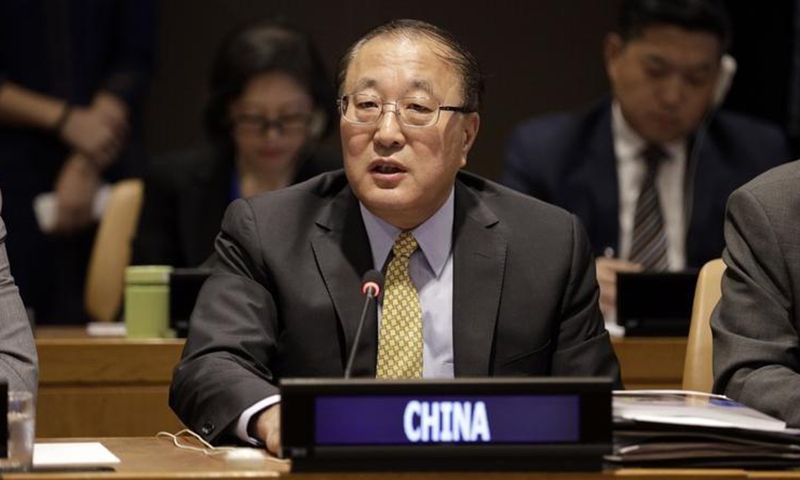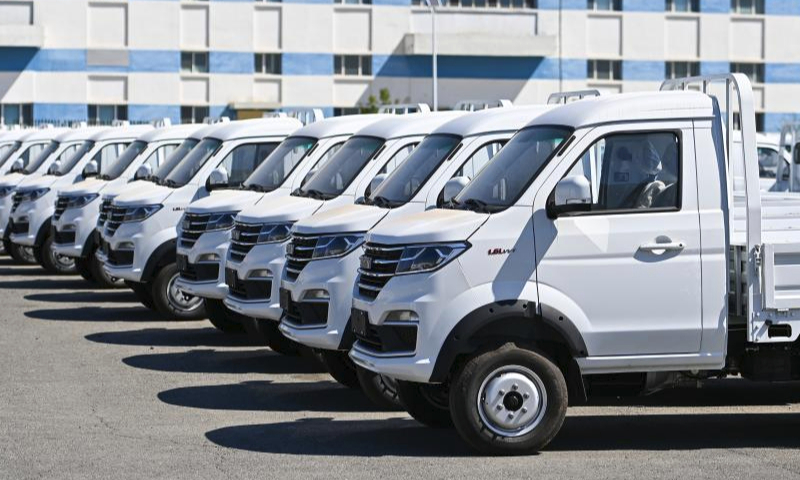
Illustration: Xia Qing/Global Times
Despite Western smears and malicious crackdowns, Northwest China's Xinjiang Uygur Autonomous Region has entered the fast lane of development, a process through which the relocation of manufacturing industries from eastern coastal regions to western inland areas will be accelerated, making a contribution to China's economic transformation and upgrading.China on Tuesday set out plans to develop a pilot free trade zone (FTZ) in its northwestern Xinjiang region. To the east, the FTZ is expected to extend Xinjiang's industry chain to coastal areas, and encourage more export-oriented, labor-intensive industry chains in the eastern region to transfer to Xinjiang; to the west, it will connect Xinjiang with Central Asia and Europe, making Xinjiang an important node of the Eurasian supply chain.
Recent decades have seen the fastest development of China's eastern regions in history, with rapid industrialization and urbanization that have brought prosperity to coastal cities. Compared with more affluent coastal areas in eastern China, the development of manufacturing industries in western regions such as Xinjiang has been relatively slow. As a result, the development of the western regions has always been a concern for the Chinese economy, with continuous efforts made to help Xinjiang and the wider western regions catch up with the more prosperous eastern areas. To some extent, Western sanctions on Xinjiang have accelerated this process.
Some Western countries, led by the US, have imposed sanctions on Xinjiang industries under the pretext of "human rights" in the past few years. The US uses the politicization of human rights issues and lies as a basis to enforce the so-called "Uyghur Forced Labor Prevention Act," blacklist Chinese entities and go after more Chinese companies. The move is actually aimed at undermining Xinjiang's prosperity and containing China's development, which should be firmly resisted.
China won't allow the West to disrupt Xinjiang's economic development. The more intense the pressure exerted by the US on Xinjiang is, the stronger the central government's support will be for the region. Just as Western sanctions against China's semiconductor industry have promoted the country's technological innovation, Western economic suppression of Xinjiang has stimulated the economic development of the region.
At a time when the West imposes sanctions on Xinjiang's industries, China has made great strides in the relocation of manufacturing industries from eastern coastal regions to western inland areas, which will play a vital role in industrial upgrading.
As China climbs up the value chain, some labor-intensive manufacturers are trying to relocate their bases. Given western inland areas' relatively low labor costs, the region has become an ideal investment destination. The newly launched FTZ in Xinjiang aims to make the region a model in the high-quality development of China's central and western areas, and facilitate its role as a bridgehead for westward opening-up. Clearly, the construction of the pilot FTZ will fuel exports of local competitive industries. Such efforts will increase Xinjiang's attractiveness for manufacturing investment, helping China expand its industry chains to the wider western regions.
More importantly, as affluent coastal areas in eastern China move away from their reliance on labor-intensive manufacturing and focus more on innovation, it is likely to lead to an overall upgrading of the country's manufacturing sector. It will be a guarantee for China to maintain its status as the "world's factory" and a global manufacturing powerhouse. Its positive significance will continue to manifest, stepping up economic structural adjustment in China and optimizing global supply chains, which will have an impact on both the Chinese and global economies.
From this perspective, foreign-funded enterprises, including Western companies, should not pass up this opportunity. Hopefully, foreign enterprises can actively participate in the pilot FTZ in Xinjiang.
The FTZ, with its extensive focus on comprehensive opening-up - ranging from trade, finance, culture and education to talent and tech cooperation - has unprecedented significance for the development of Xinjiang and will create tremendous opportunities and wealth for Chinese and foreign companies. Western smears and malicious crackdowns cannot hinder Xinjiang's development, nor can they block China's manufacturing and economic transformation and upgrading.
The author is a reporter with the Global Times. bizopinion@globaltimes.com.cn



